Related Research Articles

This timeline of computer viruses and worms presents a chronological timeline of noteworthy computer viruses, computer worms, Trojan horses, similar malware, related research and events.
Linux malware includes viruses, Trojans, worms and other types of malware that affect the Linux family of operating systems. Linux, Unix and other Unix-like computer operating systems are generally regarded as very well-protected against, but not immune to, computer viruses.
Mobile malware is malicious software that targets mobile phones or wireless-enabled Personal digital assistants (PDA), by causing the collapse of the system and loss or leakage of confidential information. As wireless phones and PDA networks have become more and more common and have grown in complexity, it has become increasingly difficult to ensure their safety and security against electronic attacks in the form of viruses or other malware.
Watering hole is a computer attack strategy in which an attacker guesses or observes which websites an organization often uses and infects one or more of them with malware. Eventually, some member of the targeted group will become infected. Hacks looking for specific information may only attack users coming from a specific IP address. This also makes the hacks harder to detect and research. The name is derived from predators in the natural world, who wait for an opportunity to attack their prey near watering holes.

Kaspersky Internet Security is a internet security suite developed by Kaspersky Lab compatible with Microsoft Windows and Mac OS X. Kaspersky Internet Security offers protection from malware, as well as email spam, phishing and hacking attempts, and data leaks. Kaspersky Lab Diagnostics results are distributed to relevant developers through the MIT License.
A supply chain attack is a cyber-attack that seeks to damage an organization by targeting less secure elements in the supply chain. A supply chain attack can occur in any industry, from the financial sector, oil industry, to a government sector. A supply chain attack can happen in software or hardware. Cybercriminals typically tamper with the manufacturing or distribution of a product by installing malware or hardware-based spying components. Symantec's 2019 Internet Security Threat Report states that supply chain attacks increased by 78 percent in 2018.

Kaspersky Lab is a Russian multinational cybersecurity and anti-virus provider headquartered in Moscow, Russia, and operated by a holding company in the United Kingdom. It was founded in 1997 by Eugene Kaspersky, Natalya Kaspersky and Alexey De-Monderik. Kaspersky Lab develops and sells antivirus, internet security, password management, endpoint security, and other cybersecurity products and services.
An advanced persistent threat (APT) is a stealthy threat actor, typically a state or state-sponsored group, which gains unauthorized access to a computer network and remains undetected for an extended period. In recent times, the term may also refer to non-state-sponsored groups conducting large-scale targeted intrusions for specific goals.
Alureon is a trojan and rootkit created to steal data by intercepting a system's network traffic and searching for banking usernames and passwords, credit card data, PayPal information, social security numbers, and other sensitive user data. Following a series of customer complaints, Microsoft determined that Alureon caused a wave of BSoDs on some 32-bit Microsoft Windows systems. The update, MS10-015, triggered these crashes by breaking assumptions made by the malware author(s).
In computer security, a wiper is a class of malware intended to erase the hard drive or other static memory of the computer it infects, maliciously deleting data and programs.
Careto, sometimes called The Mask, is a piece of espionage malware discovered by Kaspersky Lab in 2014. Because of its high level of sophistication and professionalism, and a target list that included diplomatic offices and embassies, Careto is believed to be the work of a nation state. Kaspersky believes that the creators of the malware were Spanish-speaking.
DarkHotel is a targeted spear-phishing spyware and malware-spreading campaign that appears to be selectively attacking business hotel visitors through the hotel's in-house WiFi network. It is characterized by Kaspersky Lab as an advanced persistent threat.
Regin is a sophisticated malware and hacking toolkit used by United States' National Security Agency (NSA) and its British counterpart, the Government Communications Headquarters (GCHQ). It was first publicly revealed by Kaspersky Lab, Symantec, and The Intercept in November 2014. The malware targets specific users of Microsoft Windows-based computers and has been linked to the US intelligence-gathering agency NSA and its British counterpart, the GCHQ. The Intercept provided samples of Regin for download, including malware discovered at a Belgian telecommunications provider, Belgacom. Kaspersky Lab says it first became aware of Regin in spring 2012, but some of the earliest samples date from 2003. Among computers infected worldwide by Regin, 28 percent were in Russia, 24 percent in Saudi Arabia, 9 percent each in Mexico and Ireland, and 5 percent in each of India, Afghanistan, Iran, Belgium, Austria, and Pakistan.
The Equation Group, classified as an advanced persistent threat, is a highly sophisticated threat actor suspected of being tied to the Tailored Access Operations (TAO) unit of the United States National Security Agency (NSA). Kaspersky Labs describes them as one of the most sophisticated cyber attack groups in the world and "the most advanced (...) we have seen", operating alongside the creators of Stuxnet and Flame. Most of their targets have been in Iran, Russia, Pakistan, Afghanistan, India, Syria and Mali.
Cozy Bear is a Russian advanced persistent threat hacker group believed to be associated with Russian foreign intelligence by United States intelligence agencies and those of allied countries. Dutch signals intelligence (AIVD) and American intelligence had been monitoring the group since 2014 and was able to link the hacker group to the Russian foreign intelligence agency (SVR) after compromising security cameras in their office. CrowdStrike and Estonian intelligence reported a tentative link to the Russian domestic/foreign intelligence agency (FSB). Various groups designate it CozyCar, CozyDuke, Dark Halo, The Dukes, Midnight Blizzard, NOBELIUM, Office Monkeys, StellarParticle, UNC2452 with a tentative connection to Russian hacker group YTTRIUM. Symantec reported that Cozy Bear had been compromising diplomatic organizations and national governments since at least 2010. Der Spiegel published documents in 2023 purporting to link Russian IT firm NTC Vulkan to Cozy Bear operations.
Fancy Bear is a Russian cyber espionage group. Cybersecurity firm CrowdStrike has said with a medium level of confidence that it is associated with the Russian military intelligence agency GRU. The UK's Foreign and Commonwealth Office as well as security firms SecureWorks, ThreatConnect, and Mandiant, have also said the group is sponsored by the Russian government. In 2018, an indictment by the United States Special Counsel identified Fancy Bear as GRU Unit 26165. This refers to its unified Military Unit Number of the Russian army regiments. The headquarters of Fancy Bear and the entire military unit, which reportedly specializes in state-sponsored cyberattacks and decryption of hacked data, were targeted by Ukrainian drones on July 24, 2023, the rooftop on an adjacent building collapsed as a result of the explosion.
The Lazarus Group is a hacker group made up of an unknown number of individuals, alleged to be run by the government of North Korea. While not much is known about the group, researchers have attributed many cyberattacks to them since 2010.
NetTraveler or TravNet is spyware that dates from 2004 and that has been actively used at least until 2016, infecting hundreds of often high-profile servers in dozens of countries.
Titanium is a very advanced backdoor malware APT, developed by PLATINUM, a cybercrime collective. The malware was uncovered by Kaspersky Lab and reported on 8 November 2019. According to Global Security Mag, "Titanium APT includes a complex sequence of dropping, downloading and installing stages, with deployment of a Trojan-backdoor at the final stage." Much of the sequence is hidden from detection in a sophisticated manner, including hiding data steganographically in a PNG image. In their announcement report, Kaspersky Lab concluded: "The Titanium APT has a very complicated infiltration scheme. It involves numerous steps and requires good coordination between all of them. In addition, none of the files in the file system can be detected as malicious due to the use of encryption and fileless technologies. One other feature that makes detection harder is the mimicking of well-known software. Regarding campaign activity, we have not detected any current activity [as of 8 November 2019] related to the Titanium APT."
Operation Triangulation is a targeted cyberattack on iOS devices conducted using a chain of four zero-day vulnerabilities. It was first disclosed in June 2023 and is notable for its unprecedented technical complexity among iOS attacks. The number of victims is estimated to be in the thousands.
References
- ↑ Kaspersky Labs' Global Research & Analysis Team (GReAT) (February 16, 2015). "The Great Bank Robbery: the Carbanak APT". Securelist. Archived from the original on February 17, 2015.
- ↑ "Carbanak_APT Analysis" (PDF). Kaspersky. Archived from the original (PDF) on 19 March 2017. Retrieved 12 June 2017.
- 1 2 David E. Sanger and Nicole Perlroth (14 February 2015). "Bank Hackers Steal Millions via Malware". The New York Times.
- ↑ CARBANAK Week Part One: A Rare Occurrence FireEye, 2019
- ↑ Fingas, Jon (February 14, 2015). "Subtle malware lets hackers swipe over $300 million from banks". engadget. Archived from the original on February 15, 2015.
- ↑ "Carbanak Ring Steals $1 Billion from Banks". Threatpost. 15 February 2015.
- ↑ "Carbanak – Darknet Diaries". darknetdiaries.com. Retrieved 2025-01-11.
- ↑ "The Great Bank Robbery: the Carbanak APT". Securelist. 16 February 2015.
- ↑ "FIN7 Evolution and the Phishing LNK". FireEye.
- ↑ "FIN7/Carbanak threat actor unleashes Bateleur JScript backdoor | Proofpoint US". www.proofpoint.com. July 31, 2017.
- ↑ "OpBlueRaven: Unveiling Fin7/Carbanak - Part I : Tirion". Prodaft.com.
- ↑ "OpBlueRaven: Unveiling Fin7/Carbanak - Part II : BadUSB Attacks". PRODAFT.
- ↑ Newman, Lily Hay. "THE BILLION-DOLLAR HACKING GROUP BEHIND A STRING OF BIG BREACHES". Wired.
- ↑ "Anunak APT against Financial institutions" (PDF). Fox-IT. 22 December 2014. Archived from the original (PDF) on 22 March 2015. Retrieved 4 March 2015.
- ↑ "Anunak aka Carbanak update". Fox-IT. 16 February 2015.
- ↑ "Group-IB and Kaspersky have conflicting views". Kommersant. 23 February 2015.
- ↑ "FBI, Secret service, no signs of Carbanak". Reuters. 18 February 2015. Archived from the original on 24 September 2015. Retrieved 30 June 2017.
- ↑ "Carbanak overhyped, no US banks hit". BankTechnologyNews. 19 February 2015.